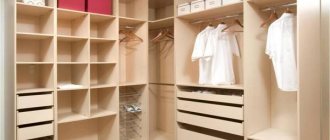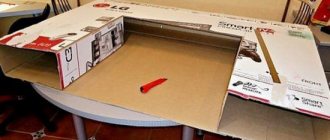Organizing the storage of documents at home is sooner or later required by any housewife. Over several decades of life, each person accumulates a large number of personal and household documents. When receipts, contracts, and birth certificates of children are dumped into one storage box, it is difficult to quickly find a small-sized ID card or SNILS. From time to time, everyone thinks about how to organize archive storage.
How to organize document storage at home
To store documents at home, you can use special shelves, drawers, and boxes. The capacity and appearance of the devices depend on the type and number of storage media. To organize the storage of documents, you need an accumulated archive:
- sort through;
- throw out what is irrelevant;
- sort the leftovers.
Folders for storing documents are purchased in advance. You will need several pieces for receipts, certificates, contracts.
To restore order, the contents of the storage facilities are placed in one pile and then carefully examined one paper at a time. Some letters and receipts have legal weight even after several decades. For example, correspondence with bailiffs stating that the ex-husband does not pay child support is saved. Such information can become an evidence base in the future.
You can easily get rid of:
- receipts from stores after the return period has expired;
- notifications from the tax office about the approaching deadline for submitting reports;
- receipts older than 3 years;
- outdated warranty cards and instructions.
Storage systems: drawer, folder, box or organizer
Organizing the storage of documents at home begins with determining the number of papers remaining after the inspection and their purpose. An entrepreneur who has registered an individual entrepreneur at his address, in addition to his personal archive, will have accumulated a lot of accounting reports and other specific information.
Work documents should be kept separate from personal ones. It is advisable to organize storage not only in different folders, but also in different drawers and cabinets.
Folders for storing documents at home must be signed and placed in a box for business papers. Markings are made on the spines.
The system for storing documents at home begins with classifying storage media by their type. You will have to buy storage folders for the following types of documents at home:
- studies (diplomas, certificates of completion of courses);
- work (work book, employment contract with the employer, certificates from the employment center, letters of gratitude);
- any documents of title to real estate, bank accounts (rent agreements, donations, purchase and sale agreements, certificate of inheritance);
- family (identity cards, national and foreign passports, SNILS, birth, marriage, divorce certificates).
- loans (agreements with credit institutions, debt repayment receipts, statements);
- purchases (receipts, warranty cards, instructions);
- utility bills (paid bills).
All that remains is to arrange the folders in boxes and drawers intended for storing documents at home. The choice of device depends on the financial capabilities and imagination of the archive owner. It could be:
- Large box for storing documents. Separators are installed between files installed in it.
- File folder. A large folder with already installed files can replace the box.
- An iron safe or box for storing documents will be useful for an entrepreneur who keeps financial reports and other important papers in his apartment.
- Case. A small suitcase with a key lock is suitable for transporting valuable documents.
In one of the rooms you can select a closet or chest of drawers, in which one or more shelves can be allocated for storing documents at home.
There are many options; you can watch the video for good ideas on how to organize document storage.
A fireproof iron box for storing documents and valuables at home, is relevant if it contains:
- papers confirming ownership;
- personal seals;
- large amounts of cash.
A folder for medical tests, books, and prescriptions should be allocated separately for each family member. This will speed up the search for the necessary documents and structure their storage.
Storing documents related to everyday life
Keep the documents of each family member, including pets, if you have any, separately.
The office supply store always sells colorful folders. Each family member should have their own color.
We put all the documents into files and insert them into a folder with rings. You can glue a piece of paper onto the folder with the name of the person to whom it belongs written. First, files with small documents should go: passports, work books and pension certificates. Next come health-related documents. These are various insurance policies, medical cards, and so on. Then documents about the apartment.
If we talk about a place to store folders, then the best place is a closet or chest of drawers. There are also special boxes and drawers for storing documents. It can be installed on the table where you work. You will be able to take out documents while working as needed, which is very convenient.
Related article: Overseas villa of Maxim Fadeev: where the famous producer lives [house design]
Organizing and storing documents at home. How to put your household papers in order (1 video)
Neat storage of documents (8 photos)
Convenient storage of documents in electronic form
Passports, marriage, divorce, and birth certificates must be scanned. If lost, it will be easier to restore them using printed copies. You can upload the information to a flash drive and duplicate it in a cloud storage, such as Yandex Disk, Google Drive or Dropbox. If the information storage device fails, the information will remain intact on the server.
The necessary instructions and warranty cards can be folded into one separate organizer for storing documents at home. Manuals that are rarely needed are converted into electronic form. To do this, you can create a text file in your laptop, and enter the full names and markings of all available household appliances there. You can scan or photograph some of the instructions.
Electronic storage of instructions is a convenient placement that saves space in your home.
Electronic storage methods allow you to save information on building materials and decorative finishes. At any time you can open the file and view information about the manufacturer, color name, collection:
- tiles;
- linoleum;
- upholstery fabric.
Scanned brochures and instructions are easy to read on the monitor. Manuals are usually printed in very small font. Photos can be enlarged to an easy-to-read size.
Most likely, there are already instructions on the Internet for your household appliances. Find it by model name. You don't have to take pictures and scan the instructions yourself.
How to put things in order in your documents?
Step 1. Gather all the papers into a pile. Assess the complexity of the entire situation. Personally, all my household documents take up a medium-sized box. There is nothing superfluous.
Step 2: Sort papers into categories. I propose this way:
- documents for the apartment
- medical documents
- tax
- credit
- payment receipts
- checks and warranty cards and so on
You can distribute them according to family members (documents of mom, dad, children, and so on). General ones can also be oriented as in the previous example.
The main thing is that you feel comfortable and can find the paper you need at any time. Sorting should be combined with decluttering and throwing away what is no longer needed. Well, advertising leaflets and brochures should be immediately thrown into the trash.
If you have any doubts about this, put the papers aside. Find out their shelf life as soon as possible. As for business cards, they can be placed in a special organizer or a small box.
Step 3. Selecting a storage method. As a rule, file folders are most often used to store documents in the house. They can be inserted separately or already integrated with the cover. This way of organizing papers is very convenient. You can buy several similar folders and assign each of them to one of the categories (tax, medical documents, and so on).
Methods of organization
To quickly find the document you need, you need to divide them into categories. Be sure to attach labels to each category, or use color coding. Paper information can be classified according to its purpose:
- medicine;
- Appliances;
- repair.
Fragmentation that is too fine will result in a clutter of folders that will make it difficult to find the help you need.
Storing documents in the office
If you have a work office, then it is more convenient to organize the storage of documents in it. Desk drawers and shelving are a convenient way to store documents at home. Place only important papers in them or those that need quick access.
It is better to store key and significant work documents in a safe. Place it in your desk drawers or closet. Furniture panels must be opaque.
A box is suitable for storing non-essential documents. If the apartment has a separate office, you can buy special office furniture. On the shelves of the cabinets, labeled folders are arranged vertically in alphabetical order.
A box for storing a large number of documents at home is not the best option. Papers are placed in a stack. When you need to find something, you have to take out the entire contents and sort through them one by one. Such manipulations take a lot of time. Therefore, for medical brochures, prescriptions, certificates, you need to use a document organizer.
Non-trivial ways to store documents
- Be sure to make paper copies (photocopies) of each document. It is most convenient to store copies together with the original. As you use up your copies, be sure to replenish them.
- Scan all important documents and store them on your computer, disk or flash drive.
- All important documents at home (if there is no special safe) can be stored in a mini-safe. One small nuance - in such safes you need to store documents and money without plastic folders or rubber bands. In the event of a fire, high temperatures will melt plastic documents faster than paper.
- A computer can be very helpful in home accounting and document management. You can make yourself reminders in your organizer. For example, take meter readings every 1st day of the month. Enter the end date of the warranty period for all devices and equipment into the calendar. After this date, you can safely get rid of packaging and warranty cards. You can also reduce the length of instructions by removing instructions in a foreign language.
- I also recommend creating a separate box in which signed duplicate keys will be stored :good: .
How do you store your documents? Share your tips and recommendations in the comments.
Any modern person has a lot of pieces of paper for all occasions. But not every one of them is worth storing.
Here is a list of documents you must have at home:
- The list opens with passports and other family documents. For example, wills, certificates.
- Certificates, powers of attorney, receipts and other things related to real estate and transport.
- Diplomas, diplomas, attestations, certificates confirming the availability of education.
- Papers related to professional activities: work books, agreements, contracts.
- Examination results, medical policies and cards.
- Warranty cards, receipts for household appliances and furniture.
- Tax related papers.
Separately, you can select electronic documents or simply data in digital format. As a rule, they correspond to one of the above points and are also subject to storage.
Documents can be divided by storage time. It depends on the validity period of each specific crust.
- Permanent. Such papers should always be at hand. These are marriage certificates, birth certificates, diplomas confirming education, medical data, information certified by a notary, wills, pension certificates.
- Long-term. Documents for real estate, cars and expensive items. These also include professional papers. You can also define checks and receipts here. This is something that is stored for a long time and remains relevant over a certain period of time.
- Short term. It is recommended to keep certificates of services from doctors, lawyers, and teachers for three years. Utility agreements and statements assume the same period.
- Useless. You can immediately throw away unnecessary educational and information materials, instructions for thoroughly studied things, calculation sheets, etc.
We suggest you familiarize yourself with what documents are needed to draw up a deed of gift for a garage.
Separately, you can note optional documents, which, however, are of great importance for their owner. These include personal diaries, notes, photographs and other memorabilia. Usually such things also last a long time.
Therefore, it is advisable to throw away everything that is not currently used and cannot be useful in the future. To maintain order, you need to regularly clean out your bins and get rid of accumulated garbage, while at the same time sorting out really important documents.
As a rule, most homes store papers as standard.
- First, documents are sorted by areas: home, work, medical and others.
- Then they are placed in signed folders, which will definitely prevent you from getting lost in the papers.
- The resulting sets are placed in a separate box or bag. By the way, for convenience, partitions are often made inside the “container” to prevent the folders from mixing. At the same time, you need to make sure that the storage location is inaccessible to children and animals, but located conveniently for use.
It's a good idea to keep frequently used personal documents separate. Your passport, medical card, Taxpayer Identification Number (TIN) and pension certificate will fit comfortably in plastic bags closed with a zipper. Such packages are airtight and will keep the contents in perfect order, preventing it from, say, getting wet. At the same time, health-related documents should be stored as accessible as possible - so as not to waste time if they are urgently needed.
Particularly important documents can be placed in a safe. The modern market offers a large selection of storage facilities, so any buyer can choose something suitable. But it is better to keep documents in a safe not in plastic folders - in the event of a fire, the material that composes them melts faster than paper.
Does the description seem boring? No problem! There are more interesting, convenient ways to store papers.
- Organizer board. There are many options for such a device. In its simplest form, it is a panel to which papers are attached with buttons. In more complex versions, the board may have small drawers and hanging mounts.
- Mini dresser. It is exactly the same as a regular chest of drawers, but much smaller. It is very convenient to store documents in it. Being sorted into different compartments, they will never get lost! The drawers in the chest of drawers can have different sizes: small ones for small pieces of paper, large ones for drawings.
- Hanging box. Just a small box or basket attached to the wall like a mailbox. In such a thing, placed in the hallway, it is convenient to store brought letters and receipts.
- Envelope pocket. Similar to the previous option, but it is not a box, but an envelope. You can attach it to a table, refrigerator, closet. Allows you to store temporarily necessary documents without taking up valuable space.
- Waste basket. No, not trash - special, for storage. Placed on a table or in a closet, it can have several compartments. A simple, inexpensive, yet effective way to store documents.
- Frequently used papers can be kept in a briefcase folder. It has a carrying handle. It is designed so that the documents in it do not get wrinkled. Typically designed for A4 paper. If necessary, in order not to waste time looking for the necessary crusts, you can simply grab a briefcase folder and run about business.
We invite you to familiarize yourself with the Documents for the privatization of a land plot under a private house and near it
Other Document Organization Ways and Ideas
People who store a large number of different important documents can purchase:
- wooden or plastic box;
- paper racks;
- sorter;
- vertical trays;
- briefcase folder;
- case with a lock;
- stationery envelopes;
- folders with a zipper or a button.
There are several rules for conveniently organizing document storage at home:
- Place papers that you rarely use further;
- Create several large folders in which you group papers in one direction;
- Choose the right size storage tools. Small documents can be stored several times in one file;
- Try to transfer the document into electronic form as much as possible to free up space;
- Audit your document archive once or twice a year.
You can buy vertical racks and boxes for storing documents at home, or make them yourself from fiberboard, plywood, or buy them at a furniture store.
Rules for storing documents at home
To ensure that your documents are always in order, review them regularly to ensure they are up to date. Get outdated quickly:
- Paid utility bills. This information is valid for three years;
- Annually renewable contracts.
It is convenient to make any payments online through your Sberbank personal account. If there are any misunderstandings with the rent, you can always find the required receipt in the history and print it out on paper. Money is also transferred for children’s meals at school, and monthly parental fees for preschool institutions are paid. The convenience is that the electronic form is stored for a long time on the bank’s official website, and does not gather dust in piles at home.
DURING REPAIRS AND VACATIONS
Apartment owners often wonder: where to put away things that will not be needed in the near future? For example, a bicycle or summer tires for a car.
According to managing partner, member of the CBRE partner network, Maria Litinetskaya, this is due to the fact that apartments are becoming more compact, instead of two rooms - a living room and a kitchen - one appears, and huge corridors and loggias are also disappearing.
“So, in recent years, people have preferred to store things in warm, guarded warehouses,” notes Litinetskaya.
In the Moscow region there are more than 35 companies that offer similar services. Rented items are stored in small boxes, from one to several tens of meters. As a rule, such a room is an empty room, separated from another by partitions made of corrugated metal - corrugated sheets. Having paid the rent, the client receives a key to his storage facility and 24-hour access to it throughout the entire rental period.
According to market players, most clients are apartment owners who need to remove furniture somewhere during renovations. In addition to them, entrepreneurs use the services: they hand over equipment they don’t need during the season for storage. The next most popular category of clients is students.
“Many young people from other regions study in the Moscow region,” explains manager Artem Skolyarov. “They go home during the holidays, and in order not to carry things with them, they leave them in such a box.
The advantage of leasing storage space is that there is no seasonality, because such services are always in demand. You do not need to obtain a license to work if you do not intend to store alcohol, tobacco, medicines, explosives, etc. Therefore, it is enough to register as an individual entrepreneur.
By the way! Renting a storage box in the Moscow region costs from 600 to 1,500 rubles. per square meter per month.
How to store paper letters, notices, recipes
There are different ways to store current documents at home. Up-to-date information sent by registered mail can be valuable to a person for several days, months, or decades. Letters are sorted immediately. Court decisions and responses from official bodies are put in a separate box or box intended for storing documents at home.
Unnecessary letters (advertising) are immediately sent to the trash bin. In a beautiful box you can temporarily store unassembled current documents. Receipts from grocery stores may remain here for two or three days, then they are thrown away.
Recipes are placed separately from all other papers in a vertical tray on the shelf of a hanging drawer. There are a large number of video ideas for storing documents at home. In gift and craft stores you can buy ready-made wooden shelves, racks for papers and paint them to your own taste.











